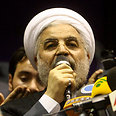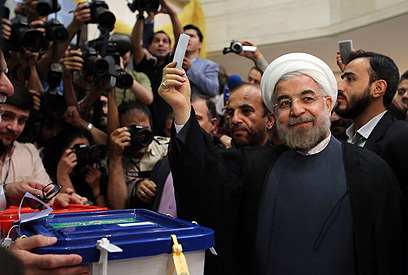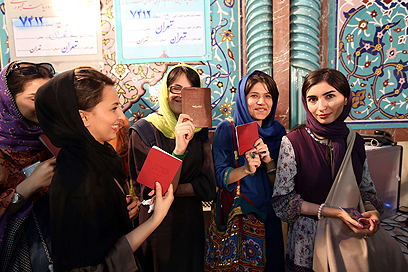
Moderate Rohani on course for outright Iran election win
With final vote results still pending, moderate Rohani leading in polls with 52%, signaling major loss for hardliners. Khamenei: No matter result 'a vote for any of these candidates is a vote for the Islamic Republic'
The vote is unlikely to radically alter ties between Tehran and the West, but if Rohani wins he has indicated he would pursue a less confrontational foreign policy than current President Mahmoud Ahmadinejad and enact a "civil rights charter" at home.
Related stories:
- Voters split but turnout high in Iran election
- Iran's polls open in presidential vote
- Reports: Iran may disqualify candidate over nuclear talk
With more than 5.2 million votes counted from the 50 million electorate, Rohani had 52.30 percent of votes cast, Iran's interior ministry said. That takes Rohani above the 50 percent of the vote he needs to avoid a second round run-off on June 21.

Rohani votes (Photo: AFP)
Rohani's nearest rival was conservative Tehran Mayor Mohammad Baqer Qalibaf, a long way behind with 17.33 percent. Other hardliner candidates scored even lower.
"Rohani is not an outsider and any gains by him do not mean the system is weak or that there are serious cracks," said Rasool Nafisi, an Iranian affairs analyst at Strayer University in Virginia. "The ruling system has made sure that no one on the ballot is going to shake things up."

Iranian women in line to vote (Photo: AFP)
Rohani received significant boosts earlier this week when reformist candidate, Mohammad Reza Aref, withdrew in his favor. His campaign was also endorsed by former presidents Mohammad Khatami and Akbar Hashemi Rafsanjani.
In contrast, Iran's big-hitting conservatives failed to organize themselves around a single candidate, suffering what appeared a decisive split in their support base as a result.
Iran's Supreme Leader Ayatollah Ali Khamenei said on Saturday that whatever the result of the presidential election it would be a vote of confidence in the Islamic Republic.
"A vote for any of these candidates is a vote for the Islamic Republic and a vote of confidence in the system," the leader's official Twitter account said.
Voting was extended by several hours at polling stations across the country on Friday as millions of Iranians turned out to cast their ballot in the first presidential race since a disputed 2009 contest led to months of political unrest.
Iran's Press TV reported that voter turnout was about 80 percent.
Security has been tight and campaigns subdued compared to the euphoric rallies that preceded the last presidential election in 2009, when reformist supporters thought they scented victory and the prospect of change in Iran.
Those hopes were dashed when rapid announcements gave Ahmadinejad 63 percent of the vote, returning him to office and starting a series of deadly protests that lasted for months.
The Associated Press contributed to this report
- Receive Ynetnews updates directly to your desktop










